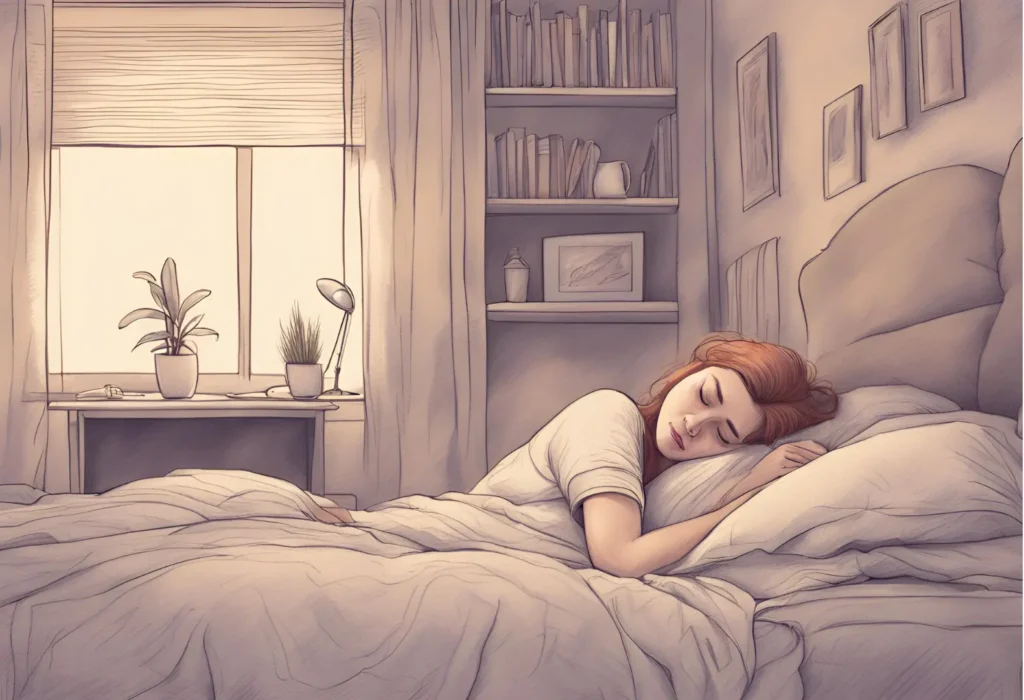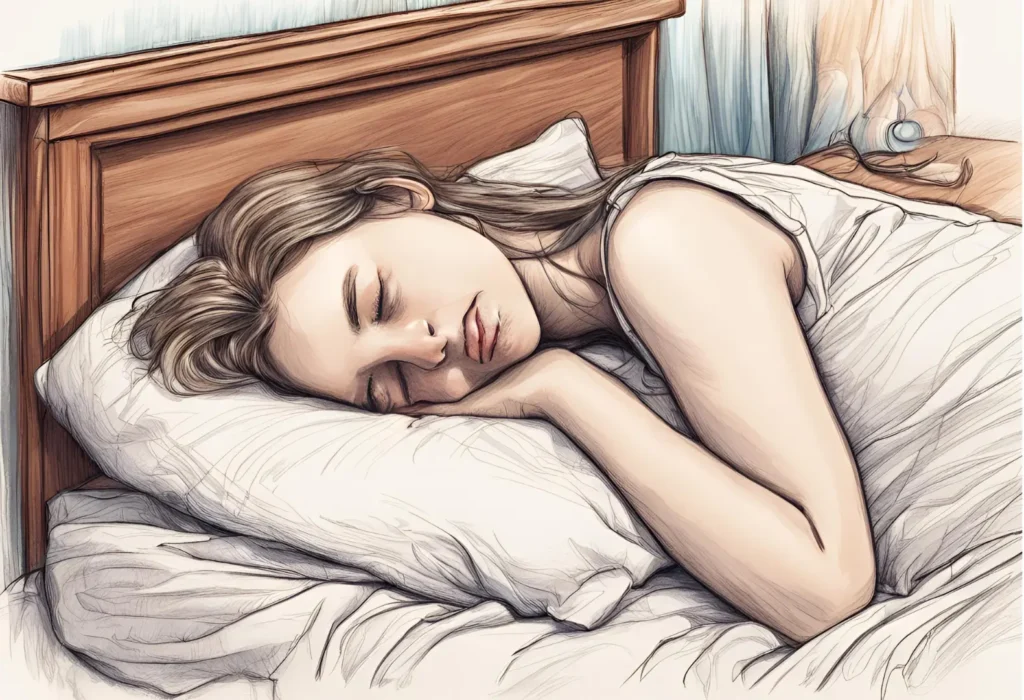Imagine a new mother, her eyes heavy with exhaustion, staring at the ceiling in the middle of the night while her newborn sleeps peacefully beside her. She’s been awake for hours, her mind racing with thoughts and worries, unable to find the rest her body desperately craves. This is the reality of postpartum insomnia, a condition that affects countless women in the weeks and months following childbirth.
Postpartum insomnia is a sleep disorder that can leave new mothers feeling drained, overwhelmed, and struggling to cope with the demands of caring for a newborn. It’s a silent battle that many face, often overshadowed by the joyous celebration of welcoming a new life into the world.
However, the impact of this condition can be far-reaching, affecting not only the mother’s physical and mental well-being but also her ability to bond with her baby and navigate the challenges of early parenthood. In this article, we’ll delve into the causes, symptoms, and effects of postpartum insomnia, exploring the various factors that contribute to this condition and its potential impact on both mother and child.
What is Postpartum Insomnia?

Postpartum insomnia refers to the difficulty new mothers experience in falling and staying asleep after childbirth. Unlike typical sleep disturbances, which might occur occasionally, postpartum insomnia is persistent and can severely affect daily functioning.
How Does It Differ from Normal Sleep Disturbances?
- Normal Sleep Disturbances: These can include occasional trouble falling asleep or waking up during the night due to external factors like noise or stress. Usually, they do not last long and resolve on their own.
- Postpartum Insomnia: This type of insomnia is more chronic. It results from a combination of physical, emotional, and hormonal changes that occur after childbirth. New mothers may find themselves unable to sleep even when their baby is resting.
Understanding these differences helps in identifying effective strategies to manage postpartum insomnia.
What Causes Postpartum Insomnia?
There are several factors that can contribute to the development of insomnia after giving birth:
Hormonal Changes
Women experience dramatic fluctuations in hormone levels after childbirth. The drop in progesterone and estrogen levels can disrupt sleep patterns. Progesterone promotes relaxation and sleepiness, while estrogen helps regulate the sleep-wake cycle. The depletion of these hormones can make it harder to fall and stay asleep.
Sleep Disruptions
Newborns require frequent feedings and diaper changes throughout the night, leading to significant sleep disruptions for new mothers. Sleeping in short increments and on an irregular schedule can desynchronize the body’s circadian rhythms, making it difficult to achieve quality, restorative sleep.
Physical Discomfort
Many women experience pain or discomfort after childbirth, such as from cesarean incisions, episiotomies, or engorgement from breastfeeding. This physical discomfort can make it challenging to find a comfortable position for sleeping.
Mental Health Conditions
Postpartum depression, anxiety, and post-traumatic stress disorder (PTSD) are risk factors for developing insomnia. These conditions can cause racing thoughts, worry, and hyperarousal that interfere with sleep. Conversely, lack of sleep can also exacerbate symptoms of mood disorders, creating a cyclical pattern.
Stress and Life Changes
The transition to parenthood brings significant lifestyle changes and added responsibilities that can be stressful and overwhelming. Stress and worries about caring for a newborn can lead to difficulties falling or staying asleep.
Pre-existing Sleep Issues
Women who experienced insomnia during pregnancy are more likely to continue having sleep problems after giving birth. Poor sleep habits developed during pregnancy may persist into the postpartum period. Understanding these potential causes is crucial for recognizing and addressing postpartum insomnia early on, as chronic sleep deprivation can have detrimental effects on a new mother’s physical and mental well-being
How Long Does Postpartum Insomnia Last?
The duration of postpartum insomnia can vary widely among new mothers. For some, sleep disturbances may last only a few weeks as their body adjusts to the changes after childbirth. For others, it can persist for several months or longer.
Factors Influencing Duration:
- Hormonal Changes: Hormones like progesterone and melatonin can take time to stabilize.
- Mental Health: Conditions such as postpartum depression or anxiety can prolong sleep issues.
- Baby’s Sleep Patterns: Irregular sleep schedules of newborns may affect the mother’s ability to rest.
- Lifestyle Factors: Stress levels, support systems, and overall health can impact recovery time.
General Timeline:
- First Few Weeks: Initial adjustment period where sleep patterns are highly disrupted.
- 3-6 Months: Many mothers start to see improvement as they adapt and their baby’s sleep becomes more predictable.
- Beyond 6 Months: Persistent insomnia might indicate underlying issues needing medical attention.
Each mother’s experience with postpartum insomnia is unique. Seeking support and employing effective sleep strategies can aid in quicker recovery.
Is Insomnia common after having a baby?
Yes, it is quite common. Many new parents experience significant sleep disturbances after childbirth. The arrival of a newborn brings numerous changes that can disrupt sleep patterns.
Several factors contribute to this:
- Nighttime Feedings: Newborns require feeding every few hours, which interrupts the parents’ sleep cycles.
- Anxiety and Stress: Concerns about the baby’s health and well-being can cause parents to stay awake or have trouble falling back asleep.
- Hormonal Changes: After childbirth, hormonal shifts affect circadian rhythms, making it harder to maintain regular sleep patterns.
- Physical Discomfort: Recovery from childbirth may involve physical discomfort that disrupts sleep.
A survey by the National Sleep Foundation found that around 70% of new mothers report problems with sleep during the postpartum period. Fathers are also affected, often losing sleep due to caregiving responsibilities and supporting their partners.
Despite being common, postpartum insomnia should not be ignored. Persistent lack of sleep can impact both physical and mental health, emphasizing the need for effective management strategies.
Ensuring new parents receive adequate support and adopt good sleep hygiene practices can help mitigate these disruptions and promote better rest during this challenging time.
Is Insomnia a sign of Postpartum Depression?
Insomnia can indeed be a sign of postpartum depression. While not everyone who experiences sleep disturbances after childbirth will develop postpartum depression, there is a significant overlap between the two conditions.
Key Symptoms to Watch For:
- Persistent sadness or low mood
- Loss of interest in activities previously enjoyed
- Feelings of guilt or worthlessness
- Difficulty bonding with the baby
Sleep problems such as trouble falling asleep or staying asleep, even when the baby is sleeping, are common symptoms of postpartum depression. This can create a vicious cycle where lack of sleep exacerbates depressive symptoms, and increased depression leads to further sleep disturbances.
Hormonal Influence:
- Postpartum hormones like estrogen and progesterone can influence mood and sleep patterns.
- A sudden drop in these hormones after childbirth can contribute to both insomnia and feelings of depression.
Mental Health Connection:
- Anxiety and stress related to newborn care can also lead to insomnia.
- In some cases, anxiety about being unable to sleep can itself cause sleeplessness, compounding the issue.
It’s essential to recognize these signs early. Addressing insomnia as part of a comprehensive approach to mental health may help alleviate some of the symptoms associated with postpartum depression. Consulting healthcare providers for proper diagnosis and treatment is crucial for overall well-being.
What is the Impact of Postpartum Insomnia on New Parents?
Postpartum insomnia can have a significant impact on new parents, affecting both mothers and fathers. It can lead to increased anxiety, exhaustion, and difficulties in parenting.
How Sleep Deprivation Affects Maternal and Paternal Well-being
Here are some ways in which sleep deprivation can affect the well-being of new parents:
- Mental Health: The lack of sleep can make existing anxiety and stress worse, making it harder for parents to handle everyday challenges.
- Physical Health: Not getting enough sleep on a regular basis weakens the immune system, making parents more prone to illnesses.
- Emotional Stability: Feeling consistently tired can result in mood swings, irritability, and even depression, impacting both partners.
The Importance of Partner Support in Dealing with Postpartum Insomnia
Having a strong partner relationship can be incredibly helpful in navigating the challenges of postpartum insomnia. Here’s why:
- Sharing Responsibilities: Dividing baby care tasks equally ensures that both parents have opportunities for rest and sleep.
- Providing Emotional Support: Offering understanding and encouragement to each other can help reduce stress and anxiety levels.
- Maintaining Open Communication: Talking openly about individual needs and difficulties creates a supportive environment, promoting overall well-being.
Understanding the impact of postpartum insomnia highlights the need to address sleep problems promptly for the sake of maintaining a healthy family dynamic.
Can Postpartum Hormones Cause Insomnia?
Hormonal changes after childbirth can significantly impact sleep. The sudden decrease in hormones like progesterone and estrogen can disrupt a mother’s sleep patterns. These hormones affect the body’s internal clock, which controls when we feel tired or awake.
How Hormones Affect Sleep
- Progesterone: This hormone is known for its calming effects. After giving birth, progesterone levels drop, leading to increased anxiety and difficulty falling asleep.
- Estrogen: Another hormone that decreases after childbirth is estrogen. This can affect serotonin levels in the brain, which play a role in mood regulation and sleep quality.
The Role of the Internal Clock
Postpartum hormonal changes can cause shifts in our sleep-wake cycle. This means that new mothers may feel tired during the day and wide awake at night. These changes in the internal clock are influenced by hormonal fluctuations.
The Impact of Stress Hormones
In addition to the hormonal changes mentioned above, stress hormones can also affect sleep after childbirth:
- Cortisol: The stress hormone cortisol may increase due to the demands of taking care of a newborn. Higher levels of cortisol make it harder to relax and fall asleep.
- Oxytocin: While oxytocin is important for bonding and breastfeeding, it can also contribute to insomnia by causing heightened alertness.
It’s important to understand how hormones can disrupt sleep in order to find effective ways to manage postpartum insomnia. This may involve making lifestyle changes, practicing relaxation techniques, or seeking medical help when necessary.
Can Breastfeeding cause Postpartum Insomnia?
Breastfeeding can contribute to postpartum insomnia in several ways. Hormones involved in milk production, such as prolactin and oxytocin, can influence sleep patterns. While prolactin promotes relaxation and sleepiness, the act of breastfeeding itself can be stimulating and may disrupt a mother’s ability to fall back asleep.
Mothers often need to wake up multiple times during the night for feedings, which fragments their sleep. This interrupted sleep schedule can lead to difficulty falling asleep or staying asleep.
Stress and anxiety related to breastfeeding challenges, such as concerns about milk supply or latch issues, may also keep mothers awake at night. Balancing breastfeeding with other responsibilities can create additional stress, impacting sleep quality.
Strategies to manage breastfeeding-related insomnia include:
- Nighttime feeding support: Having a partner assist with nighttime feedings by bringing the baby to the mother or handling some bottle feedings.
- Restful environment: Creating a calm and comfortable space for both mother and baby during nighttime feeds.
- Self-care: Prioritizing self-care activities that promote relaxation and reduce stress levels.
Breastfeeding is essential for many mothers and babies, but understanding its potential impact on sleep can help in finding ways to manage postpartum insomnia effectively.
How to Help a Mother with Postpartum Insomnia?

New mothers often neglect their own needs while caring for their newborns. Prioritizing self-care can make a significant difference in sleep quality. Simple actions like taking short naps when the baby sleeps, eating nutritious meals, and staying hydrated contribute to overall well-being. Regular physical activity, even light exercises such as walking, can also promote better sleep.
Creating a Restful Environment for Quality Sleep during the Postpartum Phase
A peaceful and restful environment is crucial for quality sleep. This might involve:
- Keeping the bedroom dark and quiet
- Using earplugs or white noise machines to block out disruptive sounds
- Ensuring a comfortable mattress and pillows
- Setting a cool room temperature
Good sleep hygiene practices, such as maintaining a consistent sleep schedule and avoiding screens before bedtime, also play a critical role.
Seeking In-Person or Online Support from Other Parents Facing Similar Sleep Challenges
Connecting with other parents who share similar experiences can be invaluable. Seeking support, whether through local parent groups or online communities, provides emotional comfort and practical advice. Sharing tips on managing sleep challenges helps new mothers feel less isolated and more empowered to handle insomnia.
Combining these strategies offers a comprehensive approach to improving sleep health during the postpartum period.
Best Medication for Postpartum Insomnia
When dealing with postpartum insomnia, some individuals may require medication if lifestyle changes or natural remedies do not provide relief. It is crucial to consult a healthcare professional to determine the safest and most effective options.
Common Medications
- Benzodiazepines: These medications are often prescribed for short-term relief. They can help with falling asleep but should be used cautiously due to the risk of dependency.
- Non-Benzodiazepine Hypnotics: Unlike benzodiazepines, these medications (such as zolpidem or eszopiclone) can aid sleep without the same level of dependency risk.
- Antidepressants: Certain antidepressants, like trazodone, have sedative effects that can assist with sleep while also addressing underlying depression or anxiety.
Considerations
- Breastfeeding: Safety profiles differ among medications, so it is important to discuss your breastfeeding status with your doctor. Some medications may pass into breast milk and potentially affect your baby.
- Side Effects: When selecting a medication, it is essential to consider possible side effects such as daytime drowsiness.
- Duration of Use: Typically, these medications are recommended for short-term use while exploring other long-term solutions like Cognitive Behavioral Therapy for Insomnia (CBT-I).
Given the complexities involved in treating postpartum insomnia with medication, personalized medical advice is indispensable. Always consult your healthcare provider to find the best treatment tailored to your specific needs.
When to Get Professional Help for Postpartum Insomnia
If you’re experiencing persistent insomnia symptoms after giving birth, it’s important to seek help from a healthcare professional. Ignoring these issues can have serious consequences for both your health and your ability to take care of your baby.
Here are some signs that indicate it’s time to reach out for professional assistance:
- You have difficulty falling asleep or staying asleep almost every night.
- Your insomnia symptoms last for more than a few weeks.
- Your lack of sleep is affecting your daily functioning and well-being.
Cognitive Behavioral Therapy for Insomnia (CBT-I) is a non-pharmacological treatment option that has proven effective. This therapy focuses on changing sleep habits and misconceptions about sleep, tailoring strategies to individual needs. CBT-I includes techniques like:
- Stimulus control: Encourages associating the bed with sleep-only activities.
- Sleep restriction: Limits time spent in bed to match actual sleep duration.
- Relaxation training: Teaches deep breathing and muscle relaxation.
Reproductive psychiatrists specialize in mental health conditions related to pregnancy and childbirth. They can offer customized treatments suited for postpartum insomnia, addressing both hormonal and psychological factors.
Seeking professional help ensures that new mothers receive appropriate care and support, preventing long-term health problems.
Conclusion
Managing postpartum insomnia is beneficial for both your own well-being and your ability to care for your baby. Make your health a priority, reach out for assistance when necessary, and approach this journey with self-assurance.



